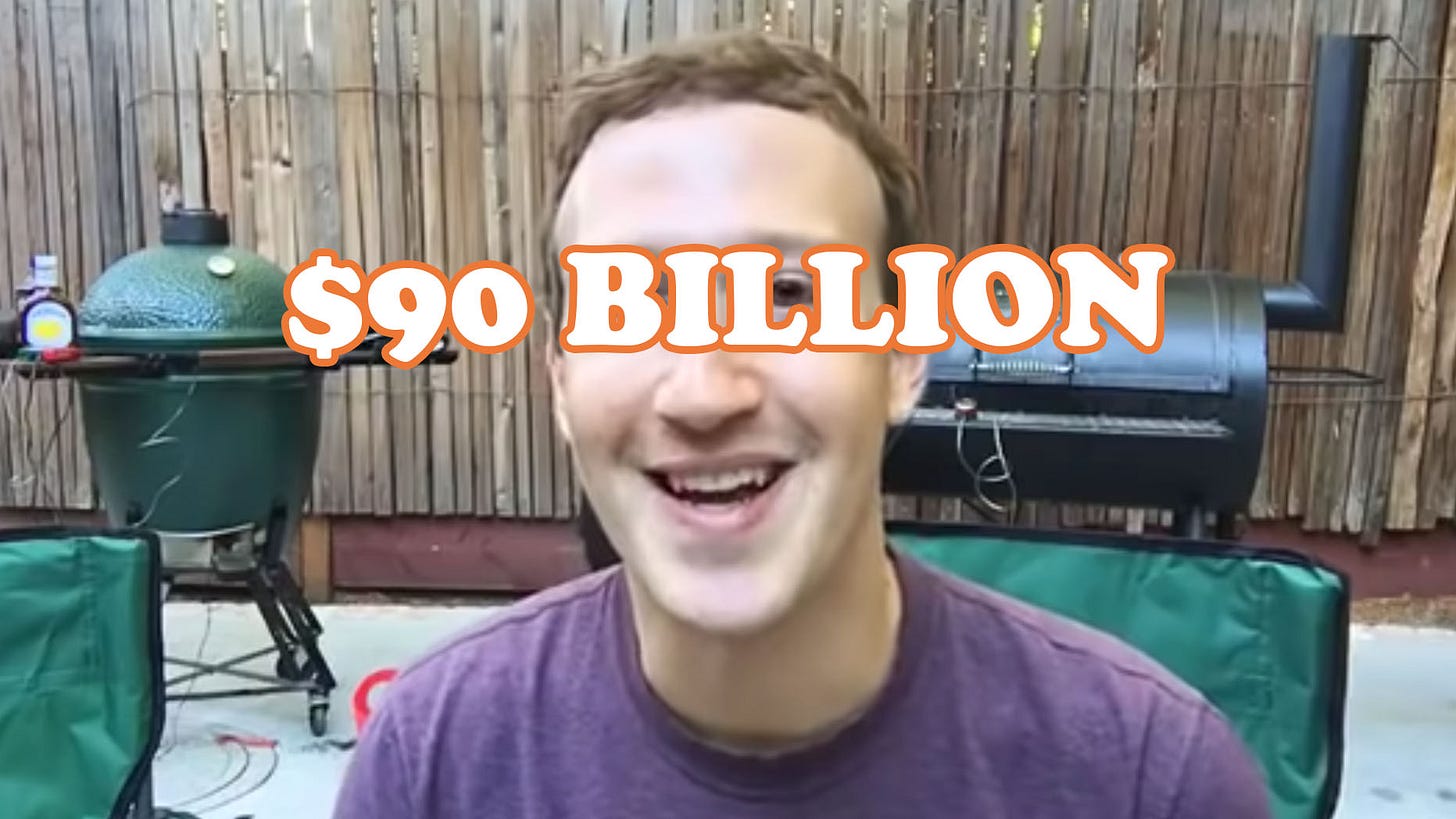🤜 Welcome back to Dog Jail Biz Beat, where we pummel fresh, dripping insights out of the week’s biggest tech and business news.
This week’s issue is a special deep dive into where tech fortunes come from. Read on to learn how you, too, can repackage metis as techne and pocket an easy billion in the process!
All of your friends are already reading Dog Jail. Maintain your precarious social standing by subscribing to Dog Jail today. 🤛
The Beatdown
Eat shit, metaverse! According to the money guys, there’s a new future of everything and its called AI. In recent months, investors with the hots for bots have thrown millions at AI startups, sending valuations soaring. At a time when writing has never been worth less, the value of ChatGPT creator OpenAI is now pegged at $29 billion.
In moments like these, it’s worth asking where all of the tech industry’s “value” comes from. Today, Facebook has a market cap of more than half a trillion dollars — almost $2,000 for every man, woman, and underage user in the United States. A meaty portion of that wealth currently belongs to Mark Zuckerberg, but where did those riches come from? Or, to put it another way, who got ripped off?
Some might say “scrollers,” correctly identifying Facebook as an ad business that sells its audience to marketers.
Others might answer “posters,” focusing on the people who create the content that all those ads run alongside.
Far fewer will mention “ghost workers,” the hidden labor force that makes most of the internet (Facebook included) worth using at all.
Moderating content on social media, refining the accuracy of algorithms, processing the data AI systems rely on: these are just some of the essential jobs performed by millions of contract workers around the world. By providing the human intelligence that all algorithmic technologies need, these are the people that make Silicon Valley’s buzziest products possible — often for less than $3 an hour.
To be fair, not all of this work pays poorly — much of it is done by users who are paid nothing at all! Whenever you click “not interested” on a YouTube recommendation or volunteer to moderate an online community, you, too, are converting intelligence into value for tech companies in some small way. Recently, a man in Iraq led an effort to preserve Sorani Kurdish by teaching it to Google Translate. Without compensation, of course:
“Google supported [us], but not in a financial way,” [Bokan] Jaff said. “I hope that Google company thinks about those who are working tirelessly to promote their company because they depend on the voluntary people.”
Thanks to Elon Musk, we now have a rough sense of what all of this cheap labor is worth. After taking over Twitter, Musk tried to automate the contract moderators that made the site safe for brands. Advertisers fled and (by Musk’s own calculation) Twitter is now worth $20 billion — $24 billion less than what he paid for it in October. Also, it’s currently full of animal torture videos, so there’s that.
Social networks, search engines, AI: these technologies only work due to huge contributions from people who have never held an employee badge. To the extent that products like Facebook, Twitter, and ChatGPT are valuable, it is because they have successfully extracted judgement, knowledge, and creativity from human beings at scale. Much of today’s AI debate centers on how generative AI privatizes the work and expertise of artists. Left unsaid is how this privatization of expertise has been going on since Google, the dominant business model of the algorithmic age.
There’s an old joke where the factory’s Big Machine breaks and a handyman fixes it with a single tap of a hammer. The factory owner is shocked to be charged $500 for such a simple act. To explain himself, the handyman itemizes his invoice: “$5 for the hammer. $495 for knowing where to swing it.” The genius of these companies is to watch handymen swing hammers at $5 a pop and then call what they’ve learned IP.
So the next time you hear a big number attached to a hot AI startup, remember that it’s not back wages for all-nighters or a lottery jackpot or a reward for being a special, clever boy. It’s somebody’s cut of a heist. And this particular scheme couldn’t be simpler: Take everything everyone has ever learned and put it in a little box labeled “mine.”
One Big Number
Times you have to stand up from your couch and shout “McDonald’s!” to make the TV commercial end in an infamous Sony patent. This week, we brushed the crumbs off our laps and stumbled one step closer that stupid future when 100,000 people signed up to get Telly, a free TV with a second screen that just shows ads and can’t be turned off.
"Telly is the biggest innovation in television since color," said the CEO of the startup which, to be clear, is making a big TV attached to a smaller TV that’s always selling you shit.
To ensure marketers get their money’s worth, Telly is also a surveillance device, tracking what viewers watch, for how long, and “the number of people who are watching at any particular time” using a “built-in sensor.”
You can stand up and shout “I hate it!” as much as you want. The innovation will never stop.
You Got Something to Say, Buddy?
Pretty spicy take this week, no? If you think we’re dead wrong or maybe have a point about something, let us know in the comments:
Opinions expressed on Dog Jail are personal and highly idiosyncratic. They are not shared by anyone.





